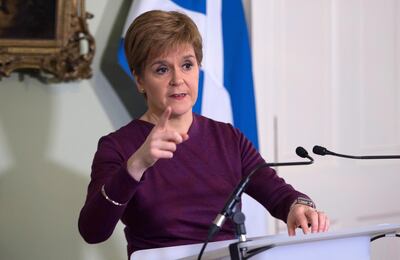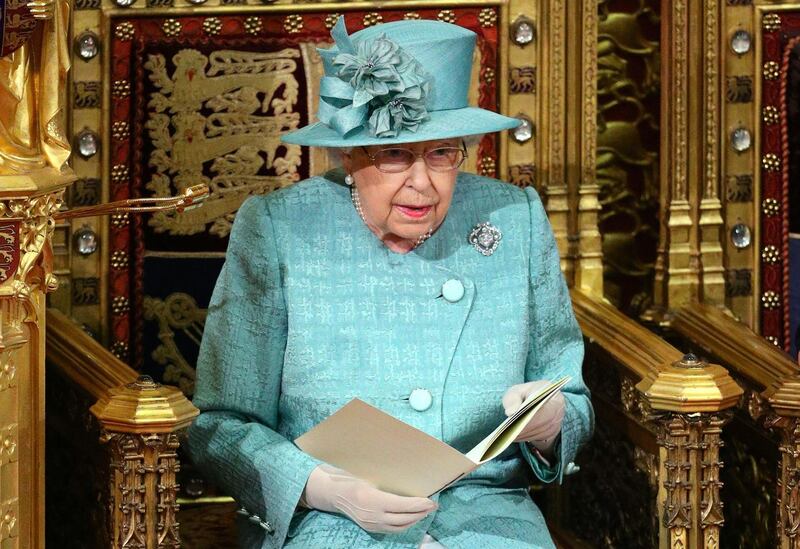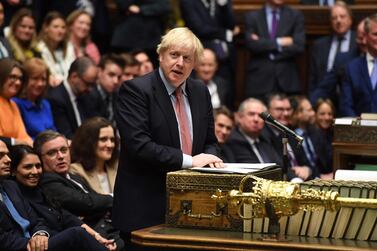Queen Elizabeth formally opened the new parliamentary session on Thursday as she unveiled the Conservative government’s plans for a radical overhaul of migration and terror laws as part of a policy shift to consolidate support among its new voters.
Boris Johnson’s party won a landslide victory in the election last week, which will allow the prime minister to push forward with taking the UK out of the European Union.
The lavish ceremony began on Thursday morning when the Queen travelled from Buckingham Palace to Westminster through emptied streets in a Bentley so she could make her speech to Parliament.
The pomp was in fact cut back. The procession normally involves the monarch being driven in a horse-drawn carriage but the state opening ceremony has been scaled down as it is the second in just two months.
The Queen’s Speech is used by the British government of the day to lay out its legislative agenda for the coming year. The speech is written by the government but read out by the monarch in front of some MPs and peers from the House of Lords.
The main item on the agenda was Brexit, with promises to implement the deal Mr Johnson agreed with Brussels in October. But other measures sought to signal the government’s agenda would be dominated by more resources for the state health care system, law and order issues and tax cuts for the least well-off.
Paul Goodman, the editor of Conservative Home, the party debate forum, said Mr Johnson was honing in on the interests of voters in the north and midlands who were previously sympathetic to Labour.
“His concentration is bent on transforming the Conservatives domestically: turning them into what he has taken to calling “the People’s Party”,” he wrote.
QUEEN’S SPEECH
— Tobias Ellwood MP (@Tobias_Ellwood) December 19, 2019
Much domestic focus but also a plan to review and reset our hard & soft power capabilities.
The character of conflict is tilting towards constant economic interference.
We are long overdue a grand strategy to better coordinate our international-facing ministries. pic.twitter.com/qkbPMFELER
A new points-based immigration system will replace the current system of freedom of movement for EU citizens. This would allow the UK to “attract the brightest and best people from the whole world", the government said.
Among domestic legislation, the government pledged to increase its funding to the National Health Service and bring in tougher sentencing for the most serious terrorist offenders, introducing a 14-year minimum jail term.

The Queen’s Speech to parliament usually takes place once a year but there was one in October following Mr Johnson’s election as Conservative leader.
Mr Johnson then called a snap election after he was left without a majority in the House of Commons following rebellions over Brexit.
With a majority of 80 MPs, the prime minister will put his Brexit divorce deal to a vote on Friday with the hope of the UK departing the EU by January 31.
However, north of the border with England, the Scottish National Party’s (SNP) victory in the election threatened the integrity of the union. The SNP won 47 out of 59 seats in the country.
Scotland’s First Minister Nicola Sturgeon called for a new independence referendum for Scotland, saying the case for a new vote was “unarguable”.
Scottish voters rejected independence in a referendum in 2014 however two years later a majority of Scots backed remaining in the EU.
"Scotland made it very clear last week it does not want a Tory government led by Boris Johnson, taking us out of the European Union," Sturgeon told reporters.
"That is the future we face if we do not have the opportunity to consider the alternative of independence."
The government said in the speech to parliament that it rejected demands for a new referendum, calling it a “damaging distraction”, which would undermine the last independence vote.








